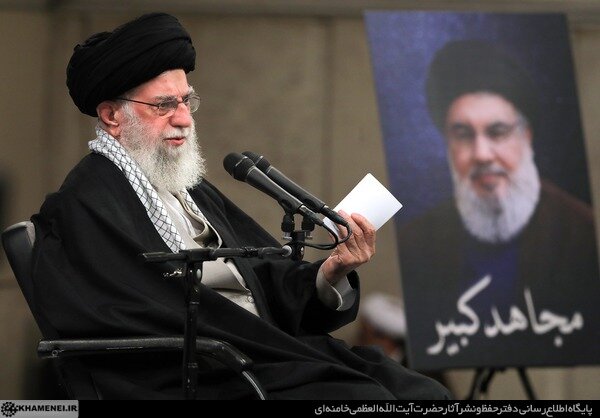“I am deeply mourning”, or in other words, It’s Far from Over!

TEHRAN – On Wednesday morning, October 2, 2024, just hours after Iran launched its second retaliatory strike against Israel, the world watched in stunned silence. The “True Promise II” operation, as it was officially dubbed, saw Iran’s Revolutionary Guard Corps (IRGC) unleash over 180 ballistic and hypersonic missiles on multiple Israeli military targets in occupied Palestine.
This devastating barrage was a direct response to Israel’s escalating aggression, and a bid to avenge the assassination of key figures: Hamas’s political leader, Ismail Haniyeh, assassinated in Tehran while attending the inauguration of Iran’s new president; Iranian military commander Brigadier General Abbas Nilforoushan, assassinated in Beirut on September 27th alongside Hezbollah Secretary General Sayyed Hassan Nasrallah. Most significantly, Israel dropped 85 American-made 2,000-pound bunker-busters in its airstrike on Beirut that resulted in the assassination of the Hezbollah leader.
As harrowing footage of Iranian missiles striking Israeli targets began to circulate, capturing both fear and fascination around the globe, speculation ran rampant about Israel's potential response. The range of possibilities, experts predicted, stretched from crippling attacks on Iranian infrastructure, such as oil facilities, to the elimination of top Iranian officials. Against this backdrop, the news of Ayatollah Khamenei, Iran's Islamic Revolution Leader, meeting with a select group of the country's scientific elite and talents, quickly spread across international media. While some saw the meeting as a dismissal of Israeli void threats, most observers anxiously awaited his pronouncements on the recent events, especially the devastating attack that had unfolded just hours earlier. The Leader, however, opted not to address the operation immediately, instead informing the nation that his thoughts on the matter, along with other recent incidents, including the assassination of Sayyed Hassan Nasrallah, would be shared "in the near future".
At the outset of his speech, Ayatollah Khamenei poignantly addressed the profound grief that had settled upon the nation following the assassination. "We are grieving these days," he declared with his voice filled with heavy sorrow. "And I, in particular, am deeply mourning this loss." He then characterized the assassination of Sayyed Hassan Nasrallah as a devastating event that had left Iran "deeply mournful."
He repeatedly invoked the word "mourn," characterizing Nasrallah's assassination as a grave incident that had cast a pall of sorrow over Iran. While this solemn preface served to underscore the meeting's significance for him, the Leader's profound emphasis on the grief surrounding Sayyed Hassan Nasrallah's death, I believe, largely went unnoticed by the audience, whose keen ears failed to fully grasp its implications.
This somber tone, in stark contrast to the celebratory mood in much of Iran and other countries as well, suggested a deeper, more enduring response to the conflict. While many hailed the success of the missile strikes, the Leader's focus on the loss of Nasrallah hinted at a broader strategy and fueled speculation about the future trajectory of the conflict.
The implication is inescapable: it’s far from over yet.
The Leader's upcoming speech on Friday is eagerly anticipated, with the world looking for clues on Iran's next move. The assassination of Nasrallah, a central figure in the resistance movement, has triggered a profound sense of grievance that extends far beyond the immediate impact of the missile strikes.
While the dramatic images of Iranian missiles striking Israeli military bases are seared into the public consciousness, the Leader's words have painted a more nuanced picture. This, he suggests, was just the beginning. Iran's mourning, he implied, is a testament to a war that will require more than just a retaliatory strike to achieve closure.
Therefore, it would be naive and shortsighted to assume that a brutal act like the assassination of Hezbollah's Secretary General could be considered settled simply by launching 180 ballistic and hypersonic missiles, even if 90% of them successfully struck their targets in the Occupied Territories. The surreal spectacle of those missiles raining down on Israeli military bases, a scene reminiscent of a Hollywood blockbuster, will forever be etched in history. But as the dust settles, the Zionist regime will confront a stark reality: for Iran, true retribution extends far beyond a mere barrage of missiles; it demands a fundamental shift in the existential balance of power.
